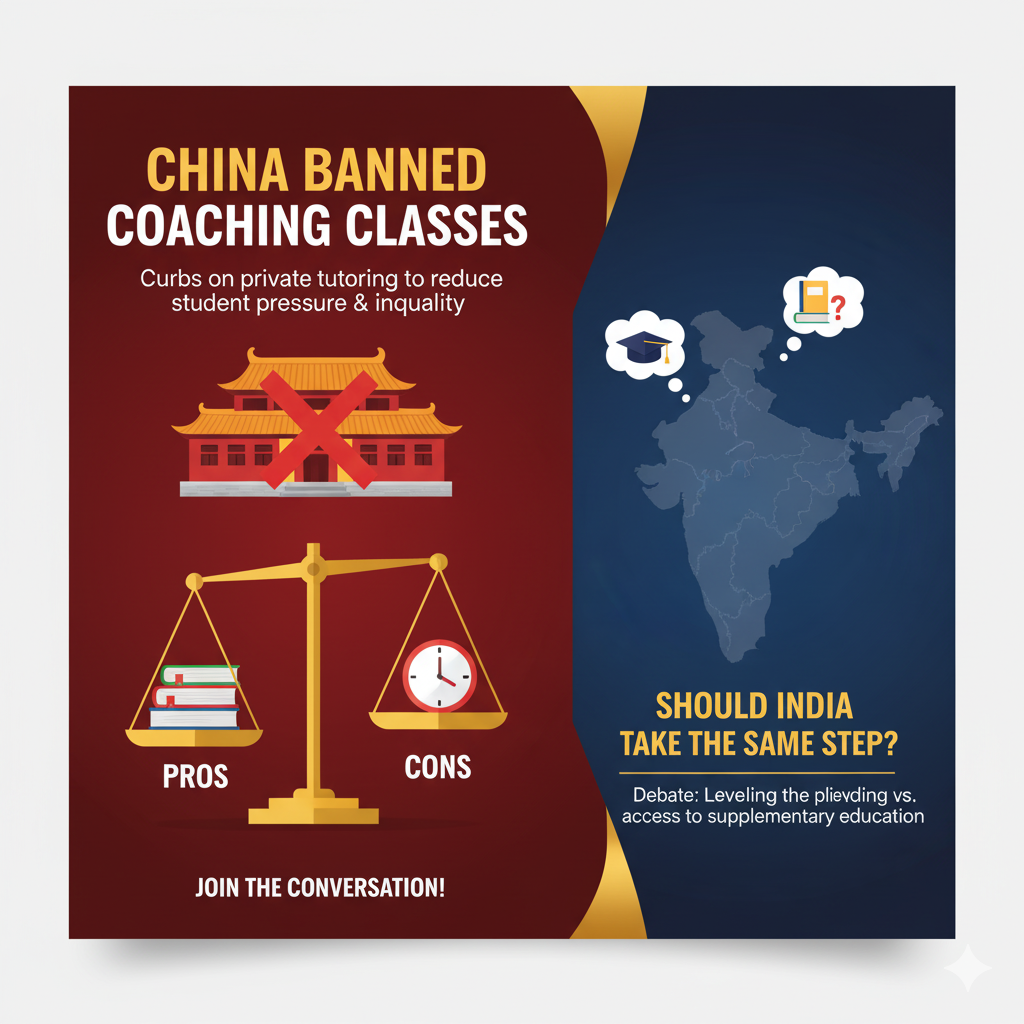
Quick highlights
- China’s 2021 “double-reduction” rules banned for-profit tutoring in core school subjects and tightly restricted the private tutoring sector.
- The policy sharply shrank China’s tutoring market, caused job losses and pushed some tutoring underground; regulators later softened enforcement as the economy slowed.
- India relies on a large coaching ecosystem (Kota and other hubs). Policymakers are debating regulation, not an outright national ban. Model guidelines for coaching were issued in 2024, and states (like Rajasthan) are framing their own laws.
- Simple takeaway: India should regulate and reform, not copy China’s blanket ban, target the harms (misleading ads, underage enrolment, student wellbeing), strengthen public schools, and manage supply through clear rules.
What China did
In July 2021, Beijing announced tough limits on after-school tuition for core subjects (the “double-reduction” push). For-profit companies that ran exam-focused tuition were barred from operating as before; advertising, foreign investment and weekend/holiday classes were heavily restricted. The goal: cut family costs, reduce student stress and ease hyper-competition.
Where that led
The move gutted a giant industry overnight — many firms closed, thousands lost jobs, and some teaching moved underground or to smaller, informal setups. Authorities have since allowed limited, non-exam tutoring to revive and to protect jobs as economic growth slowed. The policy reduced some pressure on families but also created new problems: loss of livelihoods and a shadow market.
Why India is different
- India’s coaching sector is huge and deeply woven into exam culture (IIT-JEE, NEET, law, civil services) and local economies (Kota, Delhi NCR). Sudden bans would displace millions of learners and workers.
- The Indian state has already moved toward regulation: central Guidelines for Registration and Regulation of Coaching Centres (2024) set age limits, disclosure rules and counselling requirements; states are choosing how strictly to apply or modify these rules. Rajasthan is among the states that design its own law.
How a China-style ban would play out in India (practical risks)
- Large job losses among tutors, hostel staff and allied services.
- An informal/black market for tuition may grow, making oversight harder and potentially raising costs for poorer families.
- Exam-centred demand would persist unless public schooling and exam reform reduce the perceived need for coaching.
What India should do instead (clear, short actions)
- Regulate, don’t ban: enforce registration, transparent fees, and ban misleading ads (already part of 2024 guidelines).
- Limit early enrolment & hours: stop coaching for under-16s and ban classes during school hours and holidays.
- Mental-health safeguards: mandatory counselling, capped batch sizes, reporting of suicides and stress indicators.
- Support public schools: invest in remedial teaching, better board/exam reform, so families don’t feel forced into coaching.
- Targeted support for workers: if stricter rules hit the sector, offer retraining, social protection or incentives to shift to legitimate, regulated tutoring for skills/after-school learning.
Short verdict
China’s ban shows one path, decisive but blunt, with big social and economic costs. India’s better route is measured regulation plus stronger public education and student-welfare measures. That approach tackles the real problems (pressure, misleading practices, inequality) while avoiding mass disruption.
Stay connected with Unwires.com for more geopolitics, bollywood stories, guides, and inspiration. After all, every great journey begins with a spark — and Unwires is that spark. ⚡


